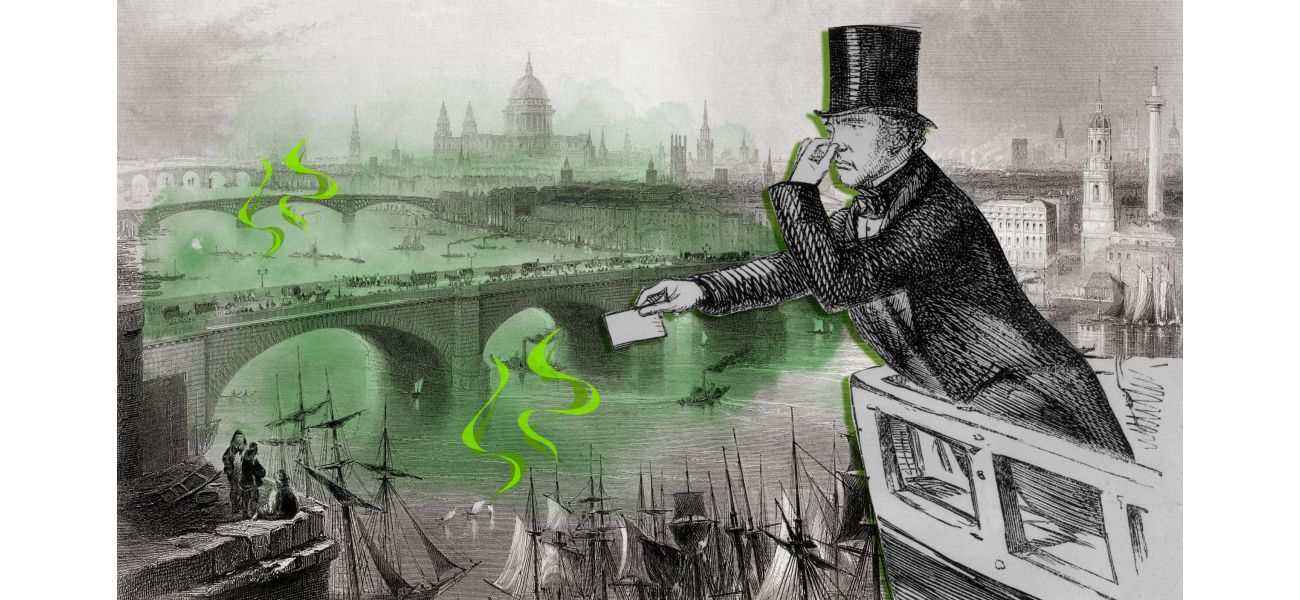The summer in London was so pungent with feces that it was feared people would not survive.
In 1858, the Great Stink led to major funding for sewers. What was it and why does it still matter today?
November 18th 2024.

In the not-so-distant past, London was plagued by a notorious pollution episode that many would like to forget. The year was 1858, and the city reeked so badly that it earned the nickname "the Great Stink". At the time, there was no proper sewage network in place, causing excrement from every resident to be washed into the Thames. The scorching summer heat only intensified the problem, creating a thick cloud of fumes that prompted the construction of a vast, modern waste pipe system that is still in use today.
Despite the advancements in sanitation, recent data has revealed that hundreds of toilets in London are still flushing directly into rivers. This alarming issue has been known for years, yet little has been done to address it. Ben Morris, a volunteer who regularly wades into the River Brent to remove sanitary items, warns that if effective action is not taken, London's sewerage revolution may go backwards.
While we may not be at the point of people tossing their chamber pots into the streets, the extent of sewage pollution in the capital is worse than many would imagine. Ben, a trustee of Brent River Park and founder of Clean Up the River Brent, explains that widespread plumbing errors are turning urban rivers into "drains", and there is no clear solution in sight.
This situation is reminiscent of the Great Stink, and while it may not be as severe, the Victorian era's depiction of the filthy Father Thames living in a swamp of waste may not be entirely outdated. So why did the Great Stink finally prompt action on sewage?
One of the main factors was the location of the Houses of Parliament, which sits right on the riverside, leaving MPs with no escape from the stench. The baking summer heat, with temperatures reaching 30°C, only added to the unbearable smell. It was reported that people would vomit just by walking near the river banks, and even MPs refused to come to work due to fears of contracting diseases such as cholera.
At the time, it was believed that the smell of human waste could spread illness, as it was not yet known that contaminated water was the main source of sickness. The overwhelming stench was the subject of despairing cartoons and news reports, causing those who could afford it to flee to the countryside for fresh air. Meanwhile, those left behind would soak their curtains in chlorinated lime bleaching powder.
MPs could ignore the sight of the polluted river from their windows, but they could not ignore the smell. Legislation was swiftly passed to construct a vast underground pipe network, which was completed in 1875 and is still in use today. This was thanks to the efforts of Victorian engineer Joseph Bazalgette, who designed a network of underground tunnels made from bricks to carry away waste water downstream. He also insisted on using Portland cement, a new and water-resistant material, to ensure the system could withstand the flow of sewage for years to come.
Bazalgette's forward-thinking decisions have allowed his system to stand the test of time, despite the ever-increasing population in London. However, the system is now under strain, with a population of nearly nine million people. To address this issue, a new "super sewer", the Tideway Tunnel, has been commissioned to reduce sewage spills from storm overflows. But this does not solve the problem of buildings being plumbed into the wrong pipe due to construction errors.
Thames Water has a program in place to identify and rectify these misconnections, but the responsibility ultimately falls on developers and freeholders to fix the errors. Unfortunately, it can be challenging to determine who should cover the costs after the initial notification. While some local authorities have taken legal action against landlords to address misconnections, there is a need for clear lines of accountability and funding to ensure these issues are quickly resolved.
In conclusion, while the Great Stink may be a thing of the past, London's sewage pollution problem is far from over. It is crucial for all parties involved to take responsibility and work together to address the issue before it gets worse. Only through effective action and cooperation can we prevent history from repeating itself.
Despite the advancements in sanitation, recent data has revealed that hundreds of toilets in London are still flushing directly into rivers. This alarming issue has been known for years, yet little has been done to address it. Ben Morris, a volunteer who regularly wades into the River Brent to remove sanitary items, warns that if effective action is not taken, London's sewerage revolution may go backwards.
While we may not be at the point of people tossing their chamber pots into the streets, the extent of sewage pollution in the capital is worse than many would imagine. Ben, a trustee of Brent River Park and founder of Clean Up the River Brent, explains that widespread plumbing errors are turning urban rivers into "drains", and there is no clear solution in sight.
This situation is reminiscent of the Great Stink, and while it may not be as severe, the Victorian era's depiction of the filthy Father Thames living in a swamp of waste may not be entirely outdated. So why did the Great Stink finally prompt action on sewage?
One of the main factors was the location of the Houses of Parliament, which sits right on the riverside, leaving MPs with no escape from the stench. The baking summer heat, with temperatures reaching 30°C, only added to the unbearable smell. It was reported that people would vomit just by walking near the river banks, and even MPs refused to come to work due to fears of contracting diseases such as cholera.
At the time, it was believed that the smell of human waste could spread illness, as it was not yet known that contaminated water was the main source of sickness. The overwhelming stench was the subject of despairing cartoons and news reports, causing those who could afford it to flee to the countryside for fresh air. Meanwhile, those left behind would soak their curtains in chlorinated lime bleaching powder.
MPs could ignore the sight of the polluted river from their windows, but they could not ignore the smell. Legislation was swiftly passed to construct a vast underground pipe network, which was completed in 1875 and is still in use today. This was thanks to the efforts of Victorian engineer Joseph Bazalgette, who designed a network of underground tunnels made from bricks to carry away waste water downstream. He also insisted on using Portland cement, a new and water-resistant material, to ensure the system could withstand the flow of sewage for years to come.
Bazalgette's forward-thinking decisions have allowed his system to stand the test of time, despite the ever-increasing population in London. However, the system is now under strain, with a population of nearly nine million people. To address this issue, a new "super sewer", the Tideway Tunnel, has been commissioned to reduce sewage spills from storm overflows. But this does not solve the problem of buildings being plumbed into the wrong pipe due to construction errors.
Thames Water has a program in place to identify and rectify these misconnections, but the responsibility ultimately falls on developers and freeholders to fix the errors. Unfortunately, it can be challenging to determine who should cover the costs after the initial notification. While some local authorities have taken legal action against landlords to address misconnections, there is a need for clear lines of accountability and funding to ensure these issues are quickly resolved.
In conclusion, while the Great Stink may be a thing of the past, London's sewage pollution problem is far from over. It is crucial for all parties involved to take responsibility and work together to address the issue before it gets worse. Only through effective action and cooperation can we prevent history from repeating itself.
[This article has been trending online recently and has been generated with AI. Your feed is customized.]
[Generative AI is experimental.]
0
0
Submit Comment





